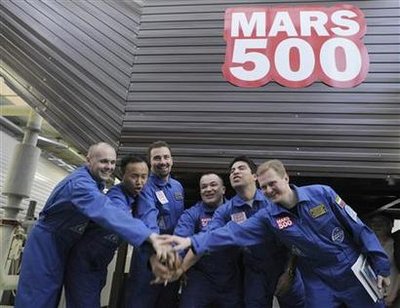莫斯科時間6月3日13時50分許,隨著“火星-500”試驗艙最后一道艙門緩緩關閉,來自中國、俄羅斯、法國和意大利的6名志愿者正式踏上長達520天的“火星之旅”,拉開人類首次全面模擬載人火星探測試驗的帷幕。“火星-500”試驗由俄羅斯聯邦航天署、俄羅斯科學院及歐洲航天局等機構聯合進行,旨在了解宇航員在未來前往火星過程中可能出現的心理和生理狀態,為載人火星探測積累經驗。試驗艙位于莫斯科的生物醫學研究所,除失重和輻射效果無法模擬外,其他條件均與國際空間站宇航員的生存環境相同。試驗艙內的志愿者只能通過電子郵件與外界聯系,而且會有40分鐘的延遲,就像真正的火星之旅一樣。此次試驗是“火星-500”模擬試驗的第三階段,鑒于從飛船發射、飛向火星、著陸火星到返回地球,需要近500天時間,“火星-500”試驗將持續520天。在此期間,6名志愿者的飲食起居將完全模擬太空生活,并體驗飛往火星、著陸火星和返回地球的全過程。據了解,志愿者將用250天模擬飛往火星,30天模擬駐留火星,240天模擬返回地球。如試驗順利,他們將于2011年11月出艙。

|
 |
|
Participants of the Mars500 experiment, which simulates a 520-day flight to Mars, pose for a picture before entering a confinement module to start their mission in Moscow June 3, 2010. |
Clad in a blue jumpsuit and waving, crew member Sukhrob Kamolov quipped "See you in 520 days!" before hopping into sealed-off chambers Thursday with five other men taking part in a simulated trip to Mars.
To cheers and air kisses from their wives and relatives, three Russians, a Chinese man, a Frenchman and an Italian-Colombian entered the wood-paneled modules where they will live until November 2011, in an experiment to test how isolation affects people.
"So many experiments out there must be done for the first time, and this is what we are doing for Mars," Anatoly Grigoriev, vice president of the Russian Academy of Sciences, told reporters before the crew "departed."
But the European Space Agency (ESA) said it would be at least 30 years before humans could go to Mars, adding it would take up to nine months each way to reach it.
Unlike a real trip to the Red Planet, the crew on the record-breaking Mars500 simulated flight, housed in Moscow's Institute of Biomedical Problems, will have gravity and no exposure to radiation.
But as on a true Mars mission, there is an alcohol ban, no fresh air, vegetables must be grown on board and the only contact with Earth will be via e-mail, with a 40-minute delay.
"When I was a little boy I asked if I could go to Mars and I am now proud that I am part of making this one day happen," said Frenchman Romain Charles, who added he will bring along his guitar for entertainment.
Wang Yue, who had trained to be an astronaut in China, said he would learn Russian during the 520 days spent closeted away to communicate with the rest of the crew.
Though both English and Russian are official languages on the simulated trip, not everyone has a common tongue.
Led by Russian commander Alexei Sitev, the crew will live and work like astronauts from the $100-billion, 16-nation International Space Station (ISS), and they will split their time between experiments and exercise.
No one will be allowed in or out of the interlinking capsules, where the men -- who were picked out of almost 10,000 applicants and are aged between 27 and 38 -- will conduct dozens of psychological tests and live in six-meter squared bedrooms.
Thirty days will be spent camping on a red sand-covered Martian surface, lined with black rocks backlit by ruby and whose curved roof glistens with fake stars.
"HARDER FOR WOMEN IN ISOLATION"
Though over a thousand women applied for the venture -- which dictates "astronauts" must be under 185cm (6ft 1in) -- females are notably absent from the mission.
"It is harder for a woman to be taken out of life and put in isolation," said Mars500 project director Boris Morukov.
"The most important thing here is motivation, and limitations would upset women. You're not allowed to talk on a telephone," he added.
The crewmembers said they would miss women terribly during the simulated trip but that the sacrifice was worth it.
"It will be hard but I just try to recall all the great travelers who found the New World and who were also without their families," Sitev said.
Last year four Russians, one German and a Frenchman successfully completed a 105-day simulated space trip at the same institute.
相關閱讀
(Agencies)

(中國日報網英語點津 Helen 編輯)